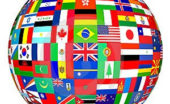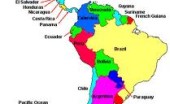Molly Minturn - My family is heartbroken to share that my father died in surgery on Monday, Feb. 10. It…
Wednesday Night #1167
Written by Diana Thebaud Nicholson // July 14, 2004 // Reports, Wednesday Nights // 1 Comment
Much more on Wednesday-Night.com
P R O L O G U E
Vive La France! We will indeed celebrate Bastille Day on Wednesday evening.
We will also be saying a fond au revoir to Juliane Zeidler who is returning to her beloved Namibia to resume her work with the firms that she co-founded prior to coming to work in Montreal at the Secretariat of the Convention on Biological Diversity. This will afford us the opportunity to look at some of the current issues in Africa and the closely related events at the AIDS Conference in Bangkok where, not incidentally, France has reproached the U.S. (again!) for its policy on local manufacture of AIDS drugs – what might be termed an “AIDS for Trade” policy. (see: France raps ‘US Aids blackmail’ bbc)
As it is summer in Montreal, we will not neglect a review of the extraordinary success of the Jazz Festival and due mention of the Nuits d’Afrique – thus bringing us back to Africa and all topics interwoven with the usual skill of the Chairman! Please join us for a festive Wednesday Night.
Richard Bruno, who now heads the McGill Office of Technology Transfer (OTT) will again be with us and we hope that you will, too.
The Report
As promised in the invitation Wednesday #1167 was a duly festive occasion, marked by both new faces and the return after a long absence of Pierre Marc Johnson.
Among the new faces welcomed this Wednesday:
Marilyn Smith, Communications Officer for Diversitas, an international global environmental change research programme
David Ainsworth, Website officer, Publications officer and now Information officer at the CBD Secretariat
Michelle Leighton, co-founder of Natural Heritage Institute, professor at Berkeley and independent expert and consultant on human rights, environment and development issues, and corporate accountability.
The much-anticipated Google IPO
This will be the largest ($ 2.7 billion) IPO ever on the Nasdaq. While most newly-public technology companies do list on the Nasdaq, there was some suspense about whether Google might choose to list on the New York Stock Exchange instead. However on Monday the company confirmed that it had applied to list its shares on the Nasdaq. The shares will be distributed and purchased by means of a Dutch auction (competing syndicate offering best price). Although it has been announced that the IPO has been on hold pending testing of the software which will be used to run the auction, as well as approval of the SEC, Wednesday Nighters believe that the delay has been because of recent poor performance of NASDAQ
Wednesday Nighters also question the value of Google shares and attribute it to the same kind of hype that accompanied the dot com frenzy. Some maintain that while it is a great search engine, Google has no business model for the future, and wonder what product the company is really selling? It is a service business offering search and e-mail capability and the potential for targeted advertising relevant to search. As a service business, their costs are variable, related to man-hours, which is very different from a product company where costs are fixed.
Montreal Festivals
The announcement of the results of the Jazz Festival’s 25th anniversary claim that more than 1.9 million people took part in the 2004 edition of the Festival, with ticket sales up 10 per cent and concession sales up 42 per cent, arouses some skepticism about the attendance figures. Overall attendance estimates are always difficult, unless for a single event such as the closing show, when the audience is concentrated in a well-defined space. As the Jazz Festival is located right in front of the Complexe Desjardins, one wonders if figures include all the office workers who may cross the street on their way to the Metro at 5 o’clock. This quibble in no way is intended to denigrate the immense success of the three main festivals, plus the Grand Prix, which represent a truly remarkable animation of the city.
Freedom of Expression or spreading hate?
What are the limits to freedom of expression? What is the role of government or its watchdogs in protecting society from hate mongers?
Should there be regulation of a talk show host who suggests that psychiatric patients should be euthanized: “Fill up the rooms, and then there’d be a switch, and once every four months, they press the button and just a little bit of gas comes out, and then you go in and pick it all up and put it in bags.”
Most Wednesday Nighters applaud the news that the CRTC has revoked the license of the Quebec City FM radio station CHOI because it has consistently ignored broadcast regulations aimed at protecting individuals and groups. The CRTC maintains that station personalities Jeff Fillion and André Arthur took positions that were racist and sexist.
However, there have been a number of voices decrying the ruling on the basis that to deny free speech is unwarranted. The Canadian Civil Liberties Association, says it amounts to censorship that can imperil legitimate news reporting, but we are left wondering how the elimination of racist and sexist statements can “imperil” news reporting? Isn’t the contrary more likely? Where should our society draw the line?
[Editor’s note: the announcement on Thursday of the decision that the CRTC has granted approval for distribution of Al-Jazeera network by cable companies is sure to further stir the pot.]
Is there a parallel to be drawn with headline performer at the Festival Juste Pour Rire Dieudonné M’Bala M’Bala, who is known for anti-Semitic rhetoric in his shows. However, Dieudonné is not a racist, he is a comedian and the stage is a place to have honest debates. In France, where he’s had to defend himself in court against charges of racial defamation, he has won all but one of the cases brought against him – and that one is in appeal. He is presenting his one-man show, written this year, “Mes excuses” about the media controversy over his humour. It has been widely acclaimed in Paris and Brussels.
Supreme Court Procedures for nomination
Two current vacancies on the Supreme Court prompted a question about the procedure followed for nominations to the Supreme Court. There are regional constraints, including the requirement for three seats for Quebec. The nominating process, unlike that for justices of the lower courts people, goes beyond the PMO and is directly handled by the Prime Minister on advice from the Justice Department, which draws up lists of suggestions of outstanding lawyers. The Quebec Bar and/or Upper Canada Law Society influence but do not initiate the process. Solid support/consensus from academia – the Law faculties – is essential. Finally, the PM will most likely rely on the advice of two or three individuals whom he trusts implicitly on institutional issues. Sometimes the PM has own ideas and nominates an individual who is so obviously outstanding. Jean Chrétien’s nomination of Louise Arbour is a case in point.
A minority Government
Canadian diplomats abroad are facing questions about how the minority government will function. Their answer is that it functions much as U.S. and European governments do, as it is the only situation when in Canada the Executive doesn’t dominate the process. Barter will be the operative word. To successfully barter deals with the opposition parties, the PM will have to ensure that he has a unified caucus without the disruptions of the Chrétien clan in revolt. Keys to unity will be the PM’s entourage and particularly the make-up of the Cabinet ,- who will be the key ministers.
The Environment
Once again, Wednesday Night asks: should Canada ratify the Kyoto Protocol to the United Nations Framework Convention on Climate Change ? Can we afford it? China and India don’t have to sign and the U.S. won’t. Does Canada’s ratification make a difference?
There is a basic consensus among scientists around the world that CO2 emissions are a problem; Not everyone agrees, but if one considers the question as a risk analysis, as a human being, it seems wiser to trust that basic consensus and make a social, political and personal statement, than to ignore the potential risk.
Kyoto is worth endorsing as a symbol of action, but the debate on this issue is clouded by confusion over the legal question of signing or not signing, whereas the real issue is a matter of implementation and substantive efforts in OECD countries, and whether some leaders of those countries can bring others on board. By determining a specific agenda for how to reduce CO2 de facto, not wasting debate on the acceptability of an instrument, we might reach an intelligent solution.
The developed (OECD) nations are telling Brazil, China, India, Indonesia, Nigeria “you have a great appetite for energy as we did in the 19th and 2oth centuries. We are going to impose restraints on you that we didn’t have”. Therefore, the major developing countries will need to ease financial and technological transfers to these countries to make the restraints less punitive.
Canada is one of few brokers in the world for Africa and other countries, has significant links with China, and has a role to play in bringing in major developing countries, such as China, India, Brazil Nigeria and Indonesia where there is huge growth coming and we know CO2 emissions will be enormous. Canada needs to lead on the quality of implementation of the objectives; in so doing, our country could do something politically very important for the U.S.
Despite the urging of many solid people in science and in the NGOs, for political reasons, the U.S. cannot be a major actor.
Will the U.S. sign Kyoto? Some feel that the U.S. Senate will probably not ratify even under [President John] Kerry, which puts Canada at odds if we implement Kyoto. How would Canada’s implementation affect competitiveness of major Canadian companies vis à vis US counterparts? However, even the Bush government has put into place some programs for CO2 inspections, but not enough. If Kerry is elected we may expect acceleration.
Note: When the US ratified the UNCCD – United Nations Convention to Combat Desertification – Clinton was President and the Republicans controlled the Senate. Opposition in the foreign relations committee was led by then-Senator (and now Attorney General) John Ashcroft. If Bush is defeated, Ashcroft and like thinkers will go down with him. There may well be less opposition in the Senate and, if the Democrats gain control of the Senate (49-51), the dynamic would change and the U.S. may sign.
A final question
In the period of 1974-80, there was an incredible will in the world to solve not only the energy problems but also in conjunction, the environmental problems. The CCMS (Committee to Challenge Modern Society) was established in response to the Club of Rome report on Limits to Growth issued in 1972,. Many countries, including the U.S. and Germany set up institutes to address those issues – what hijacked that movement?





One Comment on "Wednesday Night #1167"
Dear Diana and David –
It was yet another wonderful evening at your place. I will not be able to phrase in good words what I would like to say right now, but as I am online I want to send you big hugs and good wishes. Being part of Wednesday-night and all those interactions with you two I will definitely keep amongst my most memorable events in Canada.
Thanks for all your generosity and support and inspiring fun.
Bonne nuit, Juliane ‘Jules’ Zeidler